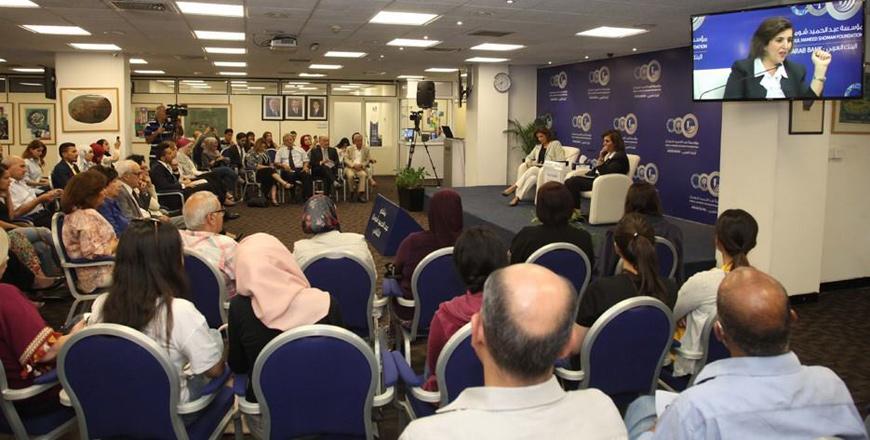You are here
‘Social misconceptions, biased marketing reinforce gender roles’
By Renad Aljadid - Jun 27,2018 - Last updated at Jun 27,2018

Participants in the discussion denounce the gender-biased marketing of some workplace regulations in Amman on Monday (Photo courtesy of Abdul Hameed Shoman Foundation)
AMMAN — Social misconceptions of gender-based laws or regulations have created a portrayal of men as “inhuman” or “non-parents”, although both men and women are two sides of the same coin, and women-targeted regulations benefit both equally, hence, must be marketed for both, a legal expert said on Monday.
During a lecture organised by the Abdul Hameed Shoman Foundation, Director of the Centre for Women’s Studies at the University of Jordan Abeer Dababneh said it is “disastrous” when some workplace regulations, such as offering daycare services at workplaces and the introduction of paternity leave, are falsely marketed to be for women, reinforcing the concept of gender roles, noting that these laws should be instead targeted at workers regardless of gender.
“Men are fathers too, why should women bear the responsibility of child rearing alone, and consequently the favour of these rights?” she asked.
“Every right that is guaranteed to support women in the workplace, is actually, directly or indirectly, falls in the interest of men, who are fathers or husbands, and humans too,” the researcher explained.
The researcher also referred to the social misconceptions, which “beautify” the domestic roles for women, but consider them to be “offensive” or “demeaning” for men to perform.
Dababneh also noted that the recent report on women’s participation in the job market has shown a drop from 14 per cent to 12 per cent, although the number of females at the higher education institutions exceeds that of men.
Titled “Women Rights: Between International and National Legislation”, the lecture also highlighted that in spite of the several women rights that are guaranteed in the country’s Constitution and laws, there is a necessity for additional mechanisms that may “apparently” seem contradictory to gender equality, but are “deeply”, in the heart of achieving equality and justice.
She cited the participation of women in political and governmental positions as an example, where some people argue that setting a quota for the women seats contradicts with the nomination on the basis of competence, not gender, although, according to Dababneh, this is the core of justice.
“When there are two birds, one has been given chances and care all throughout, while the other had to struggle and was stripped of opportunities, then it is a natural and expected end that the first will fly higher and faster while the other might fall,” the researcher, rhetorically explained.
She stressed that Jordan has been “proactive” to adopt the international agreements on women rights, yet, there are still several reservations on these rights, most notably is the right for Jordanian mothers to pass their citizenship to their children of non-Jordanian fathers.
Related Articles
Private sector institutions should further implement policies that boost gender equality and diversity in the workplace, according to field experts.
AMMAN — Jordan maintained its ranking at 46.9 points out of 100 in the “Women, Business and the Law 2022” report issued by the World Bank on
AMMAN — There are 10,000 Jordanian working women who make less than JD200, out of a total of 250,000 working women in the Kingdom, according
















